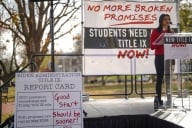You have /5 articles left.
Sign up for a free account or log in.
Wednesday started as a fairly normal day. I got out of bed bleary-eyed, stumbled down the stairs, and walked outside to get The Bloomington Herald-Times. As my eyes scanned the front page, an Associated Press story headline grabbed my attention: "Daniels Targeted 'Propaganda,' Critic." Frankly, I wasn’t too surprised to see that, given the multiple recent revelations of government spying. Nor was I shocked, as I started reading, to learn that Mitch Daniels, former Indiana governor, was virulently opposed to the writings of the late left-wing historian Howard Zinn. But as I read further in the article — based on e-mails obtained through the Freedom of Information Act — something else stopped me in my tracks: one of those opponents was me.
Let me explain.
In the summer of 2010, I taught a one-week module on the history of the labor movement as part of a three-week institute for high school teachers at Indiana University in Bloomington, sponsored by the National Endowment for the Humanities. It was called "Social Movements in Modern America: Labor, Civil Rights, and Feminism." Along with Professors Jeffrey Ogbar (University of Connecticut) and Jennifer Maher (Indiana), and supervised by Professors John Bodnar and Ted Carmines at Indiana, I worked with a highly motivated, talented and diverse group of high school and middle school teachers from around the United States.
In my section of the course, I focused on the history of labor organizing in the meat-packing industry. The week culminated with a field trip to a unionized slaughterhouse in Louisville. It was an intense week — with five hours of instruction per day — but also one of the most rewarding of my career. These were ideal "students" and they really appreciated the opportunity to expand their horizons. At the end of the week, they handed me a card with notes of gratitude from all participants.
Three years later, I still look back fondly on that experience. But I will never think of it in quite the same way, now that I know that Big Brother, aka (then) Governor Daniels, was watching.
It was February 9, 2010, a few weeks after Howard Zinn had passed away. Governor Daniels had just sent his staff an e-mail denouncing Zinn’s book, A People’s History of the United States, and asking staff if they could assure him that "it is not in use anywhere in Indiana." In short order, Scott Jenkins, the governor’s education adviser, e-mailed his boss with the URL to our institute website, prefaced by the comment: "Oh, and this is why my children will not go to IU." He added, "Zinn along with other anti American leftist readings are prominently featured." He also quoted from our site, which contained a detailed schedule of readings, and which informed teachers that they could earn professional development credit for attending.
Three minutes later, Daniels fired back the following: "This crap should not be accepted for any credit by the state. No student will be any better taught because someone sat through this session." It's unfortunate, to say the least, that Daniels viewed our curriculum about three social movements that transformed the lives of millions of Americans for the better to be "crap."
But in a sense, it was precisely to combat such attitudes that we offered the institute in the first place. Despite the changes that have taken place in the teaching of U.S. history — most obviously exemplified by Black History Month — most American students still get the message that the real movers and shakers in history are the wealthy and powerful; or if they learn about grassroots activists — such as Rosa Parks — they learn about them as heroic individuals, not part of a movement.
Now, it is true that there was an excerpt from Zinn’s People’s History included in the readings for our opening session, a roundtable on the theory and history of social movements. It was a chapter on the civil rights movement entitled, "Or Does It Explode?"
But the reason I put it there illustrates just how misguided and harmful it would be to try to censor Zinn’s ideas. In designing that session, my aim was to help teachers appreciate the challenge of explaining how and why social movements develop. In addition to reading Zinn, the teachers were assigned a wide range of pieces based on social movement theories, some of which actually challenged aspects of Zinn’s account as romantic and misleading. (I found Zinn inspiring when I first read him, but now, for my money, Zinn is actually not left-wing enough.) So, by including Zinn, my aim was not to shove his views down teachers’ throats — precisely the opposite. Which is also why I included both pro-union and anti-union websites on the syllabus. After all, the purpose of education is to help people think for themselves. That is why censorship strikes at the heart of the educational mission.
Finally, in regard to Daniels’s claim that no student would benefit from their teachers having sat through our institute, I can’t prove that we had a positive effect on the "end-users" in cities all over the country. But I can let the teachers speak for themselves. Here’s what some of them said on my thank-you card:
“What an amazing informative week.”
“You have turned one of the ‘boring’ chapters into a relevant & interesting theme in U.S. history.”
“I have learned so much and been truly inspired.”
“You successfully ‘changed’ me and the way I see the world.”
“Your enthusiasm is contagious.”
“I learned a ton. This will be very useful for me in my teaching.”
So, despite his disparagement of the value of what my colleagues and I taught, I want to thank Governor Daniels and his associates for reminding me of how much I enjoyed that summer institute and why I love teaching.








